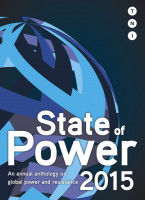State of Social Movements in South Asia: Critical Reflections and Implications
Social movements in southern Asia have been shaped by the social relations dominated by the elites of the south Asian societies who share some common features in terms of culture and ideology. The movements have become contested power games around the issues of class, caste/ethnicity, gender, region and development.

Autores
Abstract
In the Global South there is a huge research gap in linking the social movements and power dynamics within the societies. In this context, the paper analyses the contestations of social movements in the South Asia from a view point of contentious politics in the region. Despite having a long historical background, critics suggest that the social movements are increasingly contested with identity politics and agrarian issues.
Following critical discourse analysis, the paper concludes that the social movements has been shaped by the social relations dominated by the elites of the south Asian societies who share some common features in terms of culture and ideology. The movements, thus, have become contested power games around the issues of class, caste/ethnicity, gender, region and development. Finally, the paper anticipates a call for the collective colloquium of south Asian social movements.
Introduction
Globally, research on social movements reveals relatively more insights from European and Latin American studies than that of the Global South, particularly from the south Asian countries. In this context, the paper analyses the contestations of social movements in the South Asia from a view point of contentious politics in the region. Despite having a long historical background, critics suggest that the social movements are increasingly contested with identity politics and agrarian issues.
Sharing part of this critique, the paper argues that the social movement has been undergone with the formation of contested domain of polity incorporating the previously neglected issues of poverty, inequality and marginalization. Following critical discourse analysis, the paper concludes that the social movements has been shaped by the social relations dominated by the elites of the south Asian societies who share some common features in terms of culture and ideology. The movements, thus, have become contested power games around the issues of class, caste/ethnicity, gender, region and development.
It rings true in south Asian countries where the society is rapidly changing with a complex set of State-society relationship. The South Asian Association for Regional Cooperation (SAARC) is such a political complexity, which remains an economic and geopolitical power of the region. Being a homeland of number of caste and ethnic groups, the ways and process of how the social movements interact with contentious politics (and vice-versa) have been still less theorized empirically in the Asian societies.
It is seen that modernization, democratization, political ideologies and emergence of mass societies threatened the personal and collective identities and the advancement in information systems have sustained people’s struggles against the dominant world view of the State and elites.
With the end of Cold War, social movement discourse of south Asia has been featured with identity-based movements, and it became more apparent after the emergence of non-state activism in the region. Interestingly, while the People’s Movements in the respective countries were structural and political in nature, subsequent movements have been fuelled with the voices of identity and rights of socially disadvantaged ethnic groups.
In nutshell, although having a century long background of various social movements, South Asia is undergoing a burgeoning phase of social movements’ transformation, which is outcome of the various factors including reluctantly changing state structure vis-à-vis social development, rights regime, marginalization, and conflict resolutions.
There are various currents of social movements, today, across the region, which have become strengthened and highly vocal over last three decades. In this context, this essay explores whether and how there is contestation in the south Asian social movements. In operational term, the paper fleshes out the key analytical question as “How have the social movements been subject to power and contestation in the south Asia?”
